Xylitol is naturally present in trace amounts in many fruits and vegetables, but it is added in larger quantities to sugar-free candy, gum, and baked goods.

High amounts of xylitol, a popular sugar substitute, can increase the risk of heart attack, stroke, and other cardiovascular diseases, according to a new study by the Cleveland Clinic.
The study, published in the European Heart Journal, focused on xylitol’s health effects. Xylitol is a natural sugar alcohol that looks and tastes like sugar but has fewer calories. Unlike regular sugar, it doesn’t raise blood sugar levels, so diabetic patients are often advised to use it for sugar replacement.
Xylitol is naturally present in trace amounts in many fruits and vegetables, such as plums, strawberries, cauliflower, and pumpkin. It is often used in dental hygiene products, such as toothpaste, to reduce the risk of dental cavities and is generally thought to have a good safety profile.
However, larger quantities of xylitol replace sugar in sugar-free candy, gums, and baked goods.
“This study again shows the immediate need for investigating sugar alcohols and artificial sweeteners, especially as they continue to be recommended in combatting conditions like obesity or diabetes,” Dr. Stanley Hazen, chair of Cardiovascular and Metabolic Sciences at Cleveland Clinic’s Lerner Research Institute and the study’s lead researcher, said in a news release.
Artificial sweeteners are often recommended for people who suffer from cardiometabolic diseases, including obesity, diabetes, and heart disease, by multiple guideline organizations, the authors wrote in the study, citing the American Heart Association and other groups in the United Kingdom, Canada, and Australia
However, xylitol “will likely confer heightened thrombosis potential,” or blood clotting risks, “in the same vulnerable patients that it is marketed towards and intended to protect (e.g. subjects with diabetes, obesity, [cardiovascular disease]),” the authors wrote.
The researchers acknowledged that further studies are needed, as their study was observational and could not prove causation.
Excess Sweetener Can Lead to Blood Clots, Stroke
In the study, Dr. Hazen and his team examined more than 3,000 U.S. and European patients, many of whom had high blood pressure, a history of heart disease, or diabetes. The researchers determined that high levels of xylitol were associated with an elevated three-year risk of cardiovascular events. One-third of patients with the highest amount of xylitol in their blood plasma were likely to experience a cardiovascular event, such as heart attack or stroke.
Xylitol reacts with blood platelets, causing them to clot. When that reaction occurs, the body is at risk of thrombosis, or blood clotting.
A second part of the study confirmed this blood clotting reaction. The research team also found that blood platelets in people who drank xylitol-sweetened beverages were more likely to clot than those in people who had beverages sweetened with glucose.
“It does not mean throw out your toothpaste if it has xylitol in it, but we should be aware that consumption of a product containing high levels could increase the risk of blood clot related events,” Dr. Hazen said in the press release.
Diabetes Increases Other Risks
People with diabetes are already at an increased risk for high blood pressure, narrowed arteries, coronary heart disease, and stroke.
The Heart and Stroke Foundation of Canada reports that people with diabetes are at risk of developing heart disease at an earlier age. More concerningly, diabetics are three times more likely to die of heart disease.
While managing blood sugar is crucial to living with diabetes, it is also essential to make healthy lifestyle choices, such as exercising, maintaining a healthy weight, avoiding smoking, managing stress, and eating well. The foundation adds that eating fewer highly processed or ultra-processed foods, like those likely to contain sugar substitutes, is one way to follow a healthier diet. It recommends the Dietary Approaches to Stop Hypertension (DASH) diet, rich in vegetables, fruit, and low-fat dairy foods.

